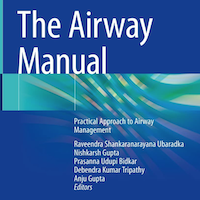Tag: laryngoscopy
The Airway Manual: Practical Approach to Airway Management
The book provides up-to-date and easy to understand information on airway management with special emphasis on practical management along with required theory background and key points. It covers all aspects of airway management... read more

Comprehensive Tracheostomy Care: The National Tracheostomy Safety Project Manual (Advanced Life Support Group)
Comprehensive Tracheostomy Care is a resource developed by the UK National Tracheostomy Safety Project (NTSP) to help promote and facilitate the safe management of tracheostomies and laryngectomies. The scope includes... read more

Tracheostomies The Complete Guide
Tracheostomies: The Complete Guide (2nd ed.) serves as a comprehensive resource for healthcare practitioners and patients navigating the complexities of tracheostomy and laryngectomy care. This edition emphasizes the... read more

Core Topics in Airway Management
Management of the airway is an important and challenging aspect of many clinicians' work and is a source of complications and litigation. The new edition of this popular book remains a clear, practical and highly-illustrated... read more

Tracheal Intubation of Critically Ill Adults: Video vs. Direct Laryngoscopy
Successful intubation on the first attempt occurred in 600 out of 705 patients (85.1%) in the video-laryngoscope group and 504 out of 712 (70.8%) in the direct-laryngoscope group (ARR, 14.3%; 95% CI, 9.9 to 18.7; p... read more
Transnasal Humidified Rapid-Insufflation Ventilatory Exchange vs. Conventional Facemask Breathing for Preoxygenation During Rapid Sequence Induction
Transnasal humidified rapid-insufflation ventilatory exchange (THRIVE), if used for pre-oxygenation and apnoeic oxygenation, has the propensity to extend the safe apnoea time and thereby decrease the incidence of desaturation... read more
Dexmedetomidine Improved Sleep Quality in the ICU After Laryngectomy
This pilot study found that a 0.03 μg/kg/h dexmedetomidine infusion improved objective and subjective sleep quality in patients admitted to the ICU after laryngectomy. The dosing regimen used was safe and feasible for use... read more
Intubation Practice and Outcomes Among Pediatric Emergency Departments
While tracheal intubation (TI) characteristics vary between pediatric Emergency Departments and ICUs, outcomes are similar. Shock and limited mouth opening were independently associated with adverse TI events in the Emergency... read more
Evolution of Inexpensive Videolaryngoscopy
Not many procedures in Medicine have received the attention and focus of medical practice, especially in critical care, as laryngoscopy. A secure airway serves as a lifeline to the critically ill, yet the process of securing... read more
First-Pass Orotracheal Intubation: Video Laryngoscopy vs. Direct Laryngoscopy
Among patients in the ICU requiring intubation, video laryngoscopy compared with direct laryngoscopy did not improve first-pass orotracheal intubation rates and was associated with higher rates of severe life-threatening... read more
Protocol and statistical analysis plan for the PREPARE II randomised clinical trial
Cardiovascular collapse is a common complication during tracheal intubation of critically ill adults. Whether administration of an intravenous fluid bolus prevents cardiovascular collapse during tracheal intubation remains... read more
Rapid Sequence Induction: Where Did the Consensus Go?
The conduct of Rapid Sequence Induction (RSI) in current emergency practice is far removed from the original descriptions of the procedure. Despite this, the principles – rapid delivery of a definitive airway and avoiding... read more
Safety of RSI in an Emergency Training Network
Implementation of an evidence-based care bundle and audit of practice has created a safe environment for trainees to learn the core critical care skill of Rapid sequence intubation (RSI). In our setting, checklist use was... read more
Sick Meningitis, POCUS for Pneumoperitoneum, and Treatment of CHS
Today on the emDocs cast with Brit Long, MD (@long_brit) and Manpreet Singh, MD (@MprizzleER) we cover three posts: the sick meningitis patient, ultrasound for pneumoperitoneum, and treatment of cannabiniod hyperemesis syndrome. Part... read more
How to Intubate the Critically Ill Like a Boss
Despite decades of experience with endotracheal intubation, we continue to find approaches to improving the process of how we intubate. In today's post we are not only going to talk about how to avoid post intubation cardiac... read more
Bougies for all intubations led to high success rates, even on difficult airways
In a randomized trial, the routine use of bougies on every DL intubation led to a higher rate of first-pass intubation success. And even allowing for the two-step technique (bougie insertion followed by ET tube insertion),... read more
Video Laryngoscopy Does Not Improve Intubation Outcomes in Critical Patients
On the basis of the results of this study, we conclude that, compared with direct laryngoscopy, video laryngoscopy does not improve intubation outcomes in emergency and critical patients. Prehospital intubation is even worsened... read more
Emergency Department Intubation Success With Succinylcholine vs. Rocuronium
In this large observational series, there was no association between paralytic choice and first-pass rapid sequence intubation success or peri-intubation adverse events. There were 2,275 rapid sequence intubations facilitated... read more
Worse outcomes with video laryngoscopy in ICU
When used in intensive care units, video laryngoscopy did not improve the chances of successful intubation on the first try, compared with direct laryngoscopy, and was associated with a significantly higher risk of severe... read more
Bag-Mask Ventilation during Tracheal Intubation of Critically Ill Adults
Among critically ill adults undergoing tracheal intubation, patients receiving bag-mask ventilation had higher oxygen saturations and a lower incidence of severe hypoxemia than those receiving no ventilation. Among the 401... read more
The PreVent Trial, Assessing the Role of Bag-mask Ventilation During Tracheal Intubation in Critically Ill Adults
In this "Breathe Easy Critical Perspective" podcast, Dr. Dominique Pepper interviews Dr. Matthew Semler. They discuss the PreVent trial, a recent publication in the 2019 issue of the NEJM that assessed the role of bag-mask... read more
Cricoid Pressure in Airway Management: The IRIS Trial
This large randomized clinical trial performed in patients undergoing anesthesia with RSI failed to demonstrate the non-inferiority of the sham procedure in preventing pulmonary aspiration. Further studies are required in... read more









